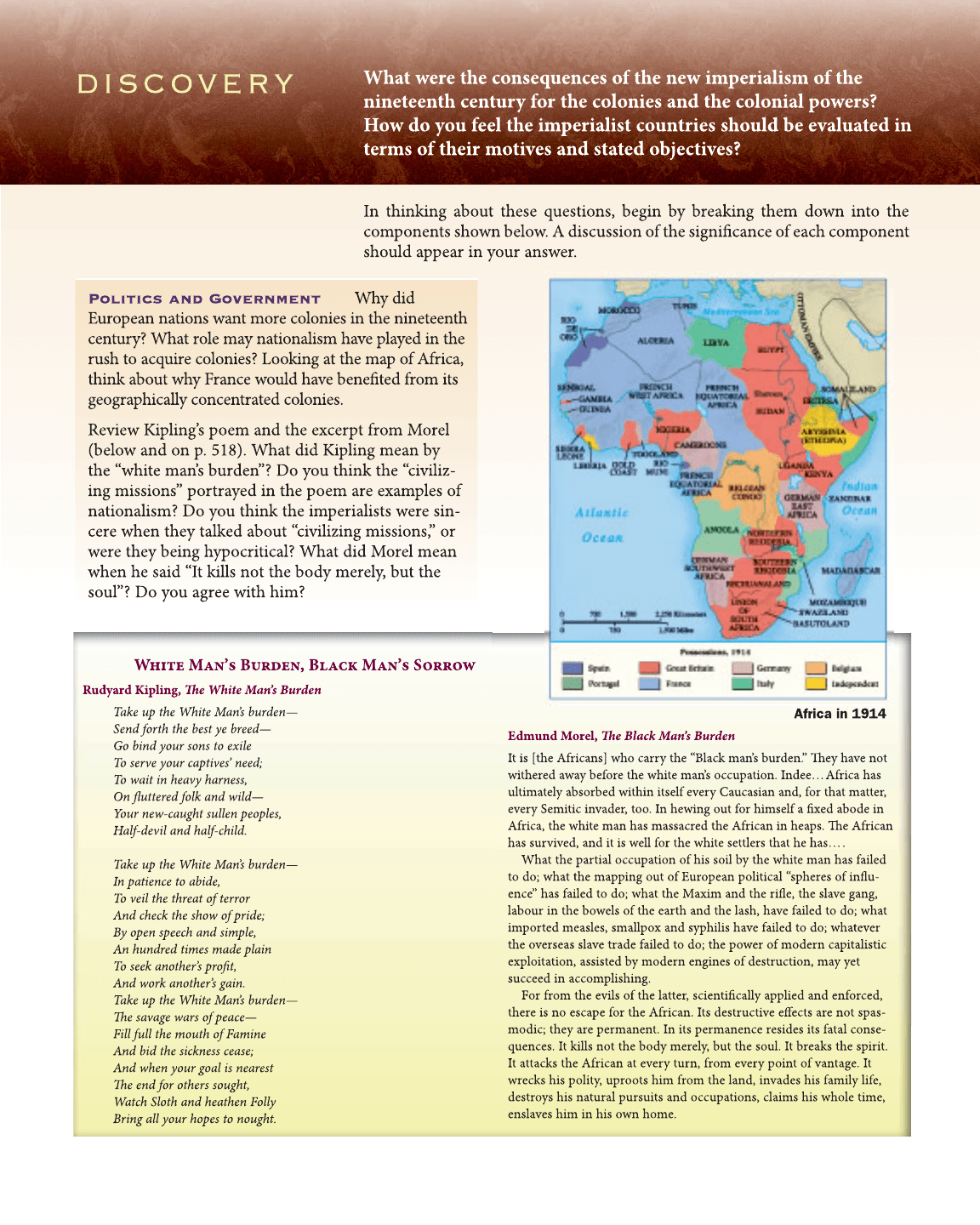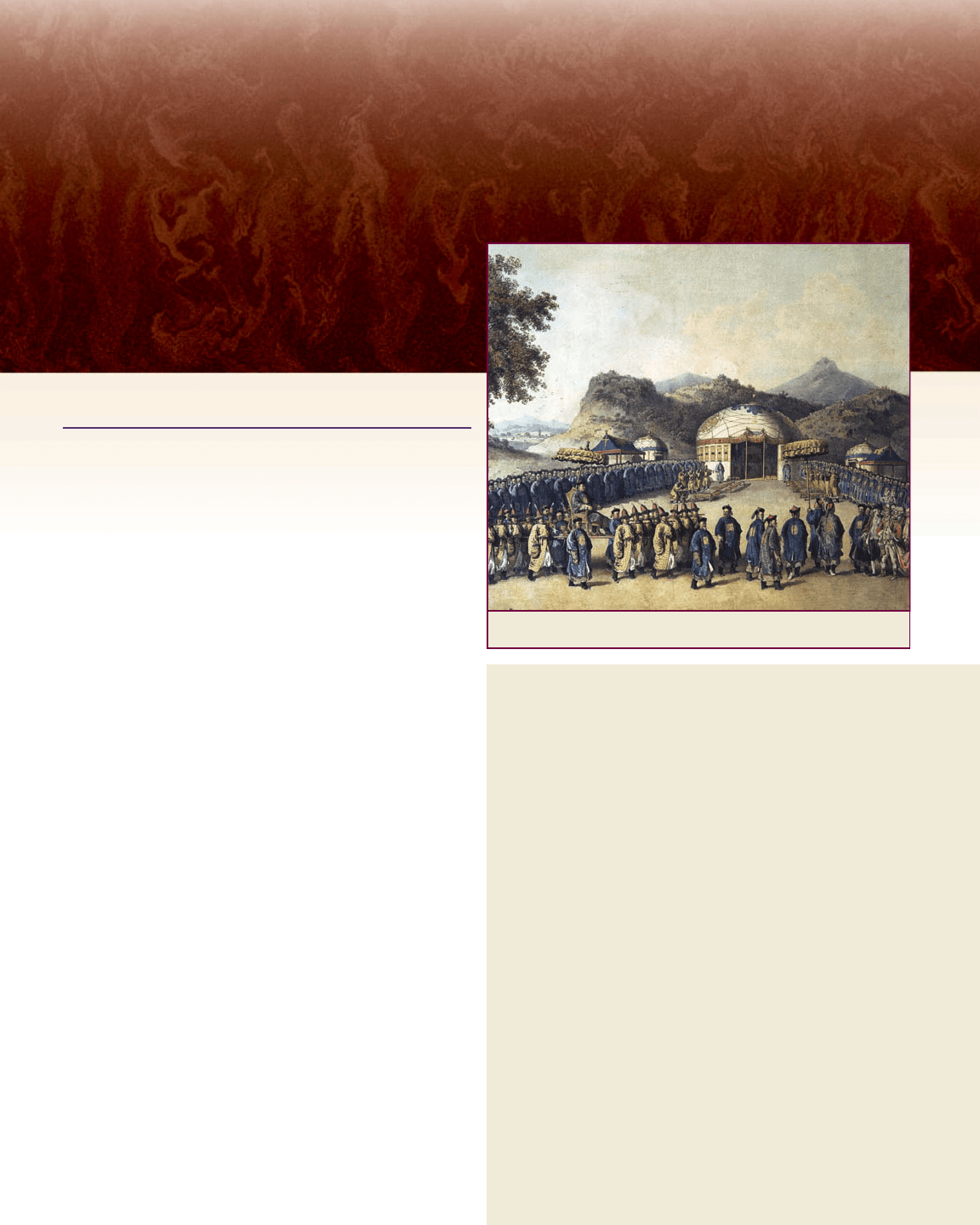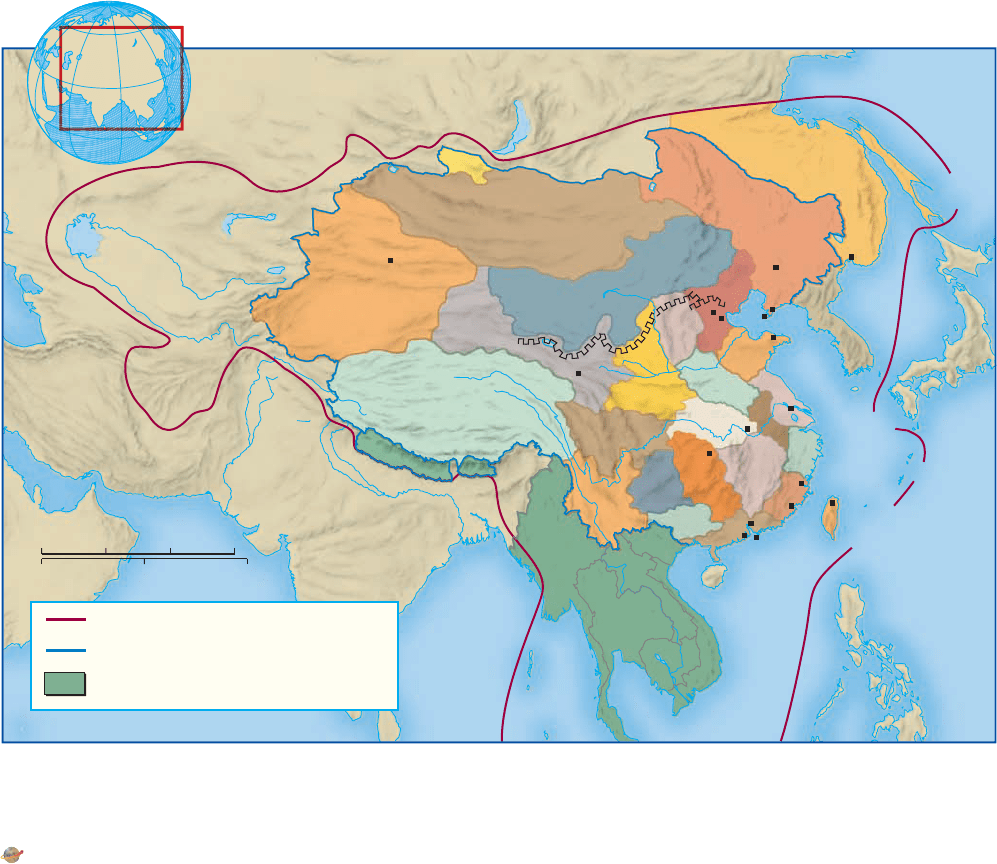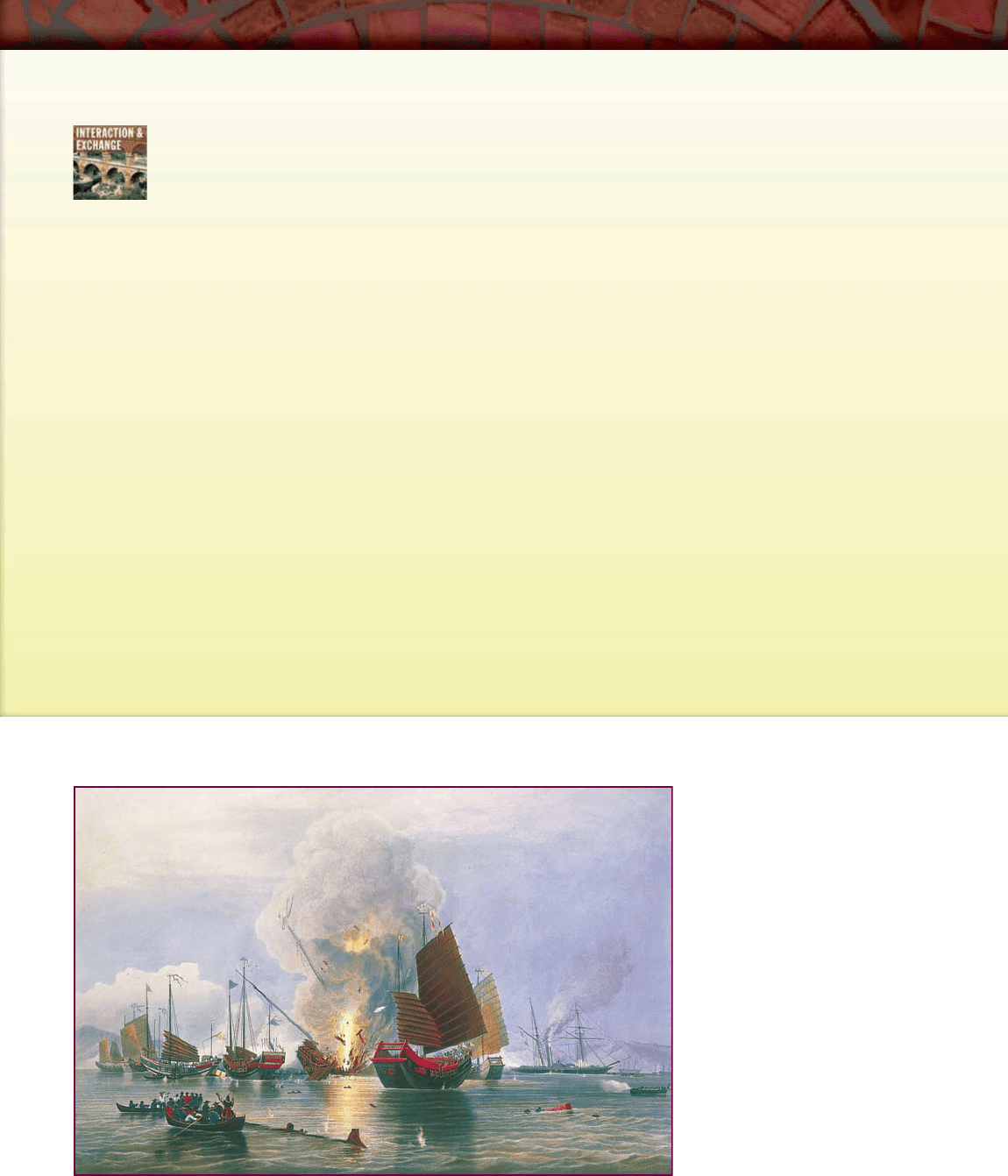Duiker William J., Spielvogel Jackson J. The Essential World History
Подождите немного. Документ загружается.


organization called Can Vuong (literally ‘‘sav e the king’’)
and continued their resistance without imperial sanction
(see the box on p. 535).
The first stirrings of nationalism in India took place
in the early nineteenth century with the search for a re-
newed sense of cultural identity. In 1828, Ram Mohan
Roy, a brahmin from Bengal, founded the Brahmo Samaj
(Society of Brahma). Roy probably had no intention of
promoting Indian national independence but created the
new organization as a means of helping his fellow reli-
gionists defend the Hindu religion against verbal attacks
by their British acquaintances.
Sometimes traditional resistance to Western penetra-
tion went beyond elite circles. Most commonly, it ap-
peared in the form of peasant revolts. Rural rebellions
were not uncommon in traditional Asian societies as a
means of expressing peasant discontent with high taxes,
official corruption, rising rural debt, and famine in the
countryside. Under colonialism, rural conditions often
deteriorated as population density increased and peasants
were driven off the land to make way for plantation
agriculture. Angry peasants then vented their frustration at
the foreign invaders. For example, in Burma, the Buddhist
monk Saya San led a peasant uprising against the British
many years after they had completed their takeover.
The Sepoy Rebellion Sometimes the resentment had a
religious basis, as in the Sudan, where the revolt led by the
Mahdi had strong Islamic overtones, although it was ini-
tially provok ed by Turkish misrule in Egypt. More signif-
icant than Roy’s Brahmo Samaj in its impact on British
policy was the famous Sepoy R ebellion of 1857 in India.
The sepoys (deriv ed from sipahi, a Turkish word meaning
horseman or soldier) were native troops hired by the East
India Company to protect British inter ests in the region.
U nrest within Indian units of the c olonial army had been
common since early in the century, when it had been
sparked by economic issues, religious sensitivities, or na-
scent anticolonial sentiment. In 1857, tension erupted
when the British adopted the new Enfield rifle for use by
sepoy infantrymen. The new weapon was a muzzle loader
that used paper cartridges cover ed with animal fat and
THE CIVILIZING MISSION IN EGYPT
In many parts of the colonial world, European
occupation served to sharpen class divisions in
traditional societies. Such was the case in Egypt,
where the British protectorate, established in the
early 1880s, benefited many elites, who profited from the intro-
duction of Western culture. Ordinary Egyptians, less inclined to
adopt foreign ways, seldom profited from the European presence.
In response, British administrators showed little patience for their
subjects who failed to recognize the superiority of Western civili-
zation. This view found expression in the words of the governor-
general, Lord Cromer, who remarked in exasperation, ‘‘The mind
of the Oriental, ...like his picturesque streets, is eminently want-
ing in symmetry. His reasoning is of the most slipshod descrip-
tion.’’ Cromer was especially irritated at the local treatment of
women, arguing that the seclusion of women and the wearing of
the veil were the chief causes of Islamic backwardness.
Such views were echoed by some Egyptian elites, who were
utterly seduced by Western culture and embraced the colonialists’
condemnation of native ways. The French-educated lawyer Qassim
Amin was one example. His book The Liberation of Women, pub-
lished in 1899 and excerpted here, precipitated a heated debate
between those who considered Western nations the liberators of
Islam and those who reviled them as oppressors.
Qassim Amin, The Liberation of Women
European civilization advances with the speed of steam and electric-
ity, and has even overspilled to every part of the globe so that there
is not an inch that he [European man] has not trodden underfoot.
Any place he goes he takes control of its resources ...and turns
them into profit ...and if he does harm to the original inhabitants,
it is only that he pursues happiness in this world and seeks it wher-
ever he may find it. ... For the most part he uses his intellect, but
when circumstances require it, he deploys force. He does not seek
glory from his possessions and colonies, for he has enough of this
through his intellectual achievements and scientific inventions.
What drives the Englishman to dwell in India and the French in
Algeria ...is profit and the desire to acquire resources in countries
where the inhabitants do not know their value or how to profit
from them.
When they encounter savages they eliminate them or drive
them from the land, as happened in America ...and is happening
now in Africa. ... When they encounter a nation like ours, with a
degree of civ ilization, with a past, and a religion ...and customs
and ...institutions ...they deal w ith its inhabitants kindly. But
they do soo n acquire its most valuable resources, because they
have greater wealth and intellect and knowledge and force. ...
[The veil constituted] a huge barrier between woman and her
elevation, and consequently a barrier between the nation and
its advance.
Q
Why did the author believe that Western culture would be
beneficial to Egyptian society? How might a critic of colonialism
have responded?
534 CHAPTER 21 THE HIGH TIDE OF IMPERIALISM

lard; because the cartridge had to be bitten off, it br oke
strictures against high-class Hindus’ eating animal prod-
ucts and M uslim prohibitions against eating pork. Protests
among sepo y units in northern India turned into a full-
scale mutin y, supported b y uprisings in rural districts in
various parts of the country. But the r ev olt lacked clear
goals, and rivalries between Hindus and Muslims and
discord among the leaders within each community pre-
vented coordination of operations. Although Indian troops
often fought bra v ely and outnumbered the British six to
one, they were poorly organized, and the British forces
(supplemented in many cases by sepoy troops) suppressed
the rebellion. Still, the revolt frightened the British, who
introduced a number of reforms and suppressed the final
OPPOSING VIEWPOINTS
T
O RESIST OR NOT TO RESIST
How to respond to the imposition of colonial rule
was sometimes an excruciating problem for politi-
cal elites in many Asian countries. Not only did re-
sistance often seem futile but it could even add to
the suffering of the indigenous population. Hoang Cao Khai and
Phan Dinh Phung were members of the Confucian scholar-gentry
from the same village in Vietnam. Yet they reacted in dramati-
cally different ways to the French conquest of their country.
Their exchange of letters, reproduced here, illustrates the
dilemmas they faced.
Hoang Cao Khai’s Letter to Phan Dinh Phung
Soon, it will be seventeen years since we ventured upon different
paths of life. How sweet was our friendship when we both lived
in our village. ... At the time when the capital was lost and after
the royal carriage had departed, you courageously answered the
appeals of the King by raising the banner of righteousness. It was
certainly the only thing to do in those circumstances. No one will
question that.
But now the situation has changed and even those without in-
telligence or education have concluded that nothing remains to be
saved. How is it that you, a man of vast understanding, do not
realize this? ...You are determined to do whatever you deem
righteous. ... But though you have no thoughts for your own per-
son or for your own fate, you should at least attend to the sufferings
of the population of a whole region. ...
Until now your actions have undoubtedly accorded with your
loyalty. May I ask however what sin our people have committed to
deserve so much hardship? I would understand your resistance, did
you involve but your family for the benefit of a large number. As of
now, hundreds of families are subject to grief; how do you have the
heart to fight on? I venture to predict that, should you pursue your
struggle, not only will the population of our village be destroyed but
our entire country will be transformed into a sea of blood and a
mountain of bones. It is my hope that men of your superior moral-
ity and honesty will pause a while to appraise the situation.
Reply of Phan Dinh Phung to Hoang Cao Khai
In your letter, you revealed to me the causes of calamities and
of happiness. You showed me clearly where advantages and
disadvantages lie. All of which sufficed to indicate that your anxious
concern was not only for my own security but also for the peace
and order of our entire region. I understood plainly your sincere
arguments.
I have concluded that if our country has survived these past
thousand years when its territory was not large, its army not strong,
its wealth not great, it was because the relationships between king
and subjects, fathers and children, have always been regulated by the
five moral obligations. In the past, the Han, the Sung, the Yuan, the
Ming time and again dreamt of annexing our country and of divid-
ing it up into prefectures and districts within the Chinese adminis-
trative system. But never were they able to realize their dream. Ah!
if even China, which shares a common border with our territory,
and is a thousand times more powerful than Vietnam, could not
rely upon her strength to swallow us, it was surely because the
destiny of our country had been willed by Heaven itself.
The French, separated from our country until the present day
by I do not know how many thousand miles, have crossed the
oceans to come to our country. Wherever they came, they acted like
a storm, so much so that the Emperor had to flee. The whole coun-
try was cast into disorder. Our rivers and our mountains have been
annexed by them at a stroke and turned into a foreign territory.
Moreover, if our region has suffered to such an extent, it was
not only from the misfortunes of war. You must realize that wher-
ever the French go, there flock around them groups of petty men
who offer plans and tricks to gain the enemy’s confidence. ... They
use ever y expedient to squeeze the people out of their possessions.
That is how hundreds of misdeeds, thousands of offenses have been
perpetrated. How can the French not be aware of all the suffering
that the rural population has had to endure? Under these circum-
stances, is it surprising that families should be disrupted and the
people scattered?
My friend, if you are troubled about our people, then I advise
you to place yourself in my position and to think about the circum-
stances in which I live. You will understand naturally and see clearly
that I do not need to add anything else.
Q
Explain briefly the reasons advanced by each writer to
justify his actions. Which argument do you think would have
earned more support from contemporaries? Why?
THE EMERGENCE OF ANTICOLONIALISM 535

remnants of the M ughal dynasty, which had supported the
mutiny; r esponsibility for governing the subcontinent was
then turned over to the crown.
Like the Sepoy Rebellion, traditional resistance
movements usually met with little success. Peasants armed
with pikes and spears were no match for Western armies
possessing the most terrifying weapons then known to
human society. In a few cases, such as the revolt of the
Mahdi at Khartoum, the natives were able to defeat the
invaders temporarily. But such successes were rare, and
the late nineteenth century witnessed the seemingly in-
exorable march of the Western powers, armed with the
Gatling gun (the first rapid-fire weapon and the precursor
of the modern machine gun), to mastery of the globe.
COMPARATIVE ESSAY
I
MPERIALISM:THE BALANCE SHEET
Few periods of history are as controversial
among scholars and casual observers as
the era of imperialism. To defenders of the
colonial enterprise like the poet Rudyard
Kipling, imperialism was the ‘‘white man’s burden,’’ a
disagreeable but necessary phase in the evolution of
human society, lifting up the toiling races from tradition
to modernity and bringing an end to poverty, famine,
and disease (see the box on p. 518).
Critics took exception to such views, portraying imperialism
as a tragedy of major proportions. The insatiable drive of
the advanced economic powers for access to raw materials
and markets created an exploitative environment that trans-
formed the vast majority of colonial peoples into a perma-
nent underclass, while restricting the benefits of modern
technology to a privileged few. Kipling’s ‘‘white man’s bur-
den’’ was dismissed as a hypocritical gesture to hoodwink
the naive and salve the guilty feelings of those who recog-
nized imperialism for what it was---a savage act of rape.
Defenders of the colonial experiment sometimes con-
cede that there were gross inequities in the colonial system
but point out that there was a positive side to the experi-
ence as well. The expansion of markets and the beginnings
of a modern transportation and communications network, while
bringing few immediate benefits to the colonial peoples, laid the
groundwork for future economic growth. At the same time, the in-
troduction of new ways of looking at human freedom, the relation-
ship between the individual and society, and democratic principles
set the stage for the adoption of such ideas after the restoration of
independence following World War II. Finally, the colonial experi-
ence offered a new approach to the traditional relationship between
men and women. Although colonial rule was by no means uni-
formly beneficial to the position of women in African and Asian so-
cieties, growing awareness of the struggle for equality by women in
the West offered their counterparts in the colonial territories a
weapon to fight against the long-standing barriers of custom and
legal discrimination.
How, then, are we to draw up a final balance sheet on the era
of Western imperialism? Both sides have good points to make, but
perhaps the critics have the best of the argument. Although the co-
lonial authorities sometimes did provide the beginnings of an infra-
structure that could eventually serve as the foundation of an
advanced industrial society, all too often they sought to prevent the
rise of industrial and commercial sectors in their colonies that
might provide competition to producers in the home country. So-
phisticated, age-old societies that could have been left to respond to
the technological revolution in their own way were thus squeezed
dry of precious national resources under the false guise of a ‘‘civiliz-
ing mission.’’ As the sociologist Clifford Geertz remarked in his
book Agricultural Involution: The Processes of Ecological Change in
Indonesia, the tragedy is not that the colonial peoples suffered
through the colonial era but that they suffered for nothing.
Q
Based on the information available to you, do you think
the imperialistic practices of the nineteenth and twentieth
centuries can be justified on moral or political grounds?
Gateway to India. Built in the Roman imperial style by the British to
commemorate the visit to India of King George V and Queen Mary in 1911, the
Gateway to India was erected at the water’s edge in the harbor of Bombay (now
Mumbai), India’s greatest port city. For thousands of British citizens arriving in
India, the Gateway to India was the first view of their new home and a symbol
of the power and majesty of the British raj.
c
William J. Duiker
536 CHAPTER 21 THE HIGH TIDE OF IMPERIALISM

TIMELINE
1800
1820 1840 1860 1880 1900
Africa
India
Southeast Asia
Slave trade declared
illegal in Great Britain
Sepoy Rebellion
Stamford Raffles
founds Singapore
First French attack
on Vietnam
Commodore Dewey defeats
Spanish fleet in Manila Bay
French and British agree
to neutralize Thailand
French protectorates
in Indochina
British rail network opened in northern India
French seize Algeria Boer War
Berlin Conference
on Africa
Opening of Suez Canal
CONCLUSION
BY THE FIRST QUARTER of the twentieth century, virtually
all of Africa and a good part of South and Southeast Asia were
under some form of colonial rule. With the advent of the age of
imperialism, a global economy was finally established, and the
domination of Western civilization over those of Africa and Asia
appeared to be complete.
Defenders of colonialism argue that the system was a necessary
if painful stage in the evolution of human societies. Critics,
however, charge that the Western colonial powers were driven by an
insatiable lust for profits (see the comparative essay ‘‘Imperialism:
The Balance Sheet’’ on p. 536). They dismiss the Western civilizing
mission as a fig leaf to cover naked greed and reject the notion that
imperialism played a salutary role in hastening the adjustment
of traditional societies to the demands of industrial civilization.
In the blunt words of two Western critics of imperialism: ‘‘Why is
Africa (or for that matter Latin America and much of Asia)
so poor? ...The answer is very brief: we have made it
poor.’’
10
Between these two irreconcilable views, where does the truth lie?
This chapter has contended that neither extreme position is justified.
Although colonialism did introduce the peoples of Asia and Africa to
new technology and the expanding economic marketplace, it was
unnecessarily brutal in its application and all too often failed to
realize the exalted claims and objectives of its promoters. Existing
economic networks---often potentially valuable as a foundation for
later economic development---were ruthlessly swept aside in the
interests of providing markets for Western manufactured goods.
Potential sources of native industrialization were nipped in the bud to
avoid competition for factories in Amsterdam, London, Pittsburgh,
or Manchester. Training in Western democratic ideals and practices
was ignored out of fear that the recipients might use them as
weapons against the ruling authorities.
The fundamental weakness of colonialism, then, was that it
was ultimately based on the self-interests of the citizens of the
colonial powers. Where those interests collided with the needs of
the colonial peoples, those of the former always triumphed.
CONCLUSION 537

SUGGESTED READING
Imperialism and Colonialism There are a number of good
works on the subject of imperialism and colonialism. For a study
that directly focuses on the question of whether colonialism was
beneficial to subject peoples, see D. K. Fieldhouse, The West and
the Third World: Trade, Colonialism, Dependence, and
Development (Oxford, 1999). Also see W. Baumgart, Imperialism:
The Idea and Reality of British and French Colonial Expansion,
1880--1914 (Oxford, 1982), and D. B. Abernathy, Global
Dominance: European Overseas Empires, 1415--1980 (New Haven,
Conn., 2000). On technology, see D. R. Headrick, The Tentacles
of Progress: Technology Transfer in the Age of Imperialism,
1850--1940 (Oxford, 1988). For a defense of the British imperial
mission, see N. Ferguson, Empire: The Rise and Demise of the
British World Order (New York, 2003).
Imperialist Age in Africa On the imperialist age in Africa,
above all see R. Robinson and J. Gallagher, Africa and the
Victorians: The Official Mind of Imperialism (London, 1961).
Also see B. Vandervoort, Wars of Imperial Conquest in Africa,
1830--1914 (Bloomington, Ind., 1998), and two works by
T. Pakenham, The Scramble for Africa (New York, 1991) and The
Boer War (London, 1979). On southern Africa, see J. Guy, The
Destruction of the Zulu Kingdom (London, 1979), and D. Nenoon
and B. Nyeko, Southern Africa Since 1800 (London, 1984). Also
informative is R. O. Collins, ed., Historical Problems of Imperial
Africa (Princeton, N.J., 1994).
India For an overview of the British takeover and
administration of India, see S. Wolpert, A New History of India,
8th ed. (New York, 2008). C. A. Bayly, Indian Society and the
Making of the British Empire (Cambridge, 1988), is a scholarly
analysis of the impact of British conquest on the Indian economy.
Also see A. Wild’s elegant East India Company: Trade and
Conquest from 1600 (New York, 2000). For a comparative
approach, see R. Murphey, The Outsiders: The Western Experience
in China and India (Ann Arbor, Mich., 1977). In a provocative
work, Ornamentalism: How the British Saw Their Empire (Oxford,
2000), D. Cannadine argues that it was class and not race that
motivated British policy in the subcontinent.
Colonial Age in Southeast Asia General studies of the
colonial period in Southeast Asia are rare because most authors
focus on specific areas. For some stimulating essays on a variety of
aspects of the topic, see Continuity and Change in Southeast Asia:
Collected Journal Articles of Harry J. Benda (New Haven, Conn.,
1972). For an overv iew by several authors, see N. Tarling, ed., The
Cambridge History of Southeast Asia, vol. 3 (Cambridge, 1992).
Women in Africa and Asia For an introduction to the effects
of colonialism on women in Africa and Asia, see S. Hughes and
B. Hughes, Women in World History, vol. 2 (Armonk, N.Y., 1997).
Also consult the classic by E. Boserup, Women’s Role in Economic
Development (London, 1970); J. Taylor, The Social World of
Batavia (Madison, Wis., 1983); and L. Ahmed, Women and
Gender in Islam (New Haven, Conn., 1992).
The ultimate result was to deprive the colonial peoples of the right
to make their own choices about their own destiny.
The continent of Africa and southern Asia were not the only
areas of the world that were buffeted by the winds of Western
expansionism in the late nineteenth century. The nations of eastern
Asia, and those of Latin America and the Middle East as well, were
also affected in significant ways. The consequences of Western
political, economic, and military penetration varied substantially
from one region to another, however, and therefore require separate
treatment. The experience of East Asia will be dealt with in the next
chapter. That of Latin America and the Middle East will be
discussed in Chapter 24.
Visit the website for The Essential World History to access study
aids such as Flashcards, Critical Thinking Exercises, and
Chapter Quizzes:
www.cengage.com/history/duikspiel/essentialworld6e
538 CHAPTER 21 THE HIGH TIDE OF IMPERIALISM

539

CHAPTER 22
SHADOWS OVER THE PACIFIC:
EAST ASIA UNDER CHALLENGE
CHAPTER OUTLINE
AND FOCUS QUESTIONS
The Decline of the Manchus
Q
Why did the Qing dynasty decline and ultimately
collapse, and what role did the Western powers play
in this process?
Chinese Society in Transition
Q
What political, economic, and social reforms were
instituted by the Qing dynast y during its final decades,
and why were they not more successful in reversing the
decline of Manchu rule?
A Rich Country and a Strong State:
The Rise of Modern Japan
Q
To what degree was the Meiji Restoration a ‘‘revolution,’’
and to what degree did it succeed in transforming
Japan?
CRITICAL THINKING
Q
How did China and Japan each respond to Western
pressures in the nineteenth century, and what
implication did their different responses have for
each nation’s history?
The Macartney mission to China, 1793
The Art Archive/Eileen Tweedy
540
THE BRITISH EMISSARY Lord Macartney had arrived in
Beijing in 1793 with a caravan loaded with six hundred cases of gifts
for the emperor. Flags and banners provided by the Chinese pro-
claimed in Chinese characters that the visitor was an ‘‘ambassador
bearing tribute from the country of England.’’ But the tribute was in
vain, for Macartney’s request for an increase in trade between the two
countries was flatly rejected, and he left Beijing in October with noth-
ing to show for his efforts. Not until half a century later would the
Qing dynasty---at the point of a gun---agree to the British demand for
an expansion of commercial ties.
In fact, the Chinese emperor Qianlong had responded to the
requests of his visitor with polite but poorly disguised condescension.
To Macartney’s proposal that a British ambassador be stationed in the
capital of Beijing, the emperor replied that such a request was ‘‘not in
harmony with the state system of our dynasty and will definitely not be
permitted.’’ As for the British envoy’s suggestion that regular trade rela-
tions be established between the two countries, that proposal was also
rejected. We receive all sorts of precious things, replied the Celestial
Emperor, as gifts from the myriad nations. ‘‘Consequently,’’ he added,
‘‘there is nothing we lack, as your principal envoy and others have
themselves observed. We have never set much store on strange or inge-
nious objects, nor do we need more of your country’s manufactures.’’

The Decline of the Manchus
Q
Focus Question: Why did the Qing dynasty decline
and ultimately collapse, and what role did the Western
powers play in this process?
In 1800, the Qing (Ch’ing) or Manchu dynasty was at the
height of its power. China had experienced a long period
of peace and prosperity under the rule of two great em-
perors, Kangxi and Qianlong. Its borders were secure, and
its culture and intellectual achievements were the envy of
the world. Its rulers, hidden behind the walls of the For-
bidden City in Beijing, had every reason to describe their
patrimony as the ‘‘Central Kingdom.’’ But a little over a
century later, humiliated and harassed by the black ships
and big guns of the Western powers, the Qing dynasty, the
last in a series that had endured for more than two
thousand years, collapsed in the dust (see Map 22.1).
Historians once assumed that the primary reason
for the rapid d ecline and fall of t he Manchu dynasty was
the intense pressure applied to a proud but somewhat
complacent traditional society by the modern West.
Now, however, most historians believe that internal
changes played a major role in the dynasty’s collapse
andpointoutthatatleastsomeoftheproblemssuf-
fered by the Manc hus during the nineteenth century
were self-inflicted.
Both explanations have some validity. Like so many
of its predecessors, after an extended period of growth,
the Qing dynasty began to suffer from the familiar dy-
nastic ills of official corruption, peasant unrest, and in-
competence at court. Such weaknesses were probably
exacerbated by the rapid growth in population. The long
era of peace and stability, the introduction of new crops
from the Americas, and the cultivation of new, fast-
ripening strains of rice enabled the Chinese population
to double between 1550 and 1800. The population
continued to grow, reaching the unprecedented level of
400 million by the end of the nineteenth century. Even
without the irritating presence of the Western powers, the
Manchus were probably destined to repeat the fate of
their imperial predecessors. The ships, guns, and ideas
of the foreigners simply highlighted the growing weakness
of the Manchu dynasty and likely hastened its demise. In
doing so, Western imperialism still exerted an indelible
impact on the history of modern China---but as a con-
tributing, not a causal, factor.
Opium and Rebellion
By 1800, Westerners had been in contact with China for
more than two hundred years, but after an initial period
of flourishing relations, Western traders had been limited
to a small commercial outlet at Canton. This arrangement
was not acceptable to the British, however. Not only did
they chafe at being restricted to a tiny enclave, but the
growing British appetite for Chinese tea created a severe
balance-of-payments problem. After the failure of the
Macartney mission in 1793, another mission, led by Lord
Amherst, arrived in China in 1816. But it too achieved
little except to worsen the already strained relations be-
tween the two countries. The British solution was opium.
A product more addictive than tea, opium was grown in
northeastern India and then shipped to China. Opium
had been grown in southwestern China for several hun-
dred years but had been used primarily for medicinal
purposes. Now, as imports increased, popular demand for
the product in southern China became insatiable despite
an official prohibition on its use. Soon bullion was
flowing out of the Chinese imperial treasury into the
pockets of British merchants.
The Chinese became concerned and tried to negoti-
ate. In 1839, Lin Zexu (Lin Tse-hsu; 1785--1850), a Chi-
nese official appointed by the court to curtail the opium
trade, appealed to Queen Victoria on both moral and
practical grounds and threatened to prohibit the sale of
rhubarb (widely used as a laxative in nineteenth-century
Europe) to Great Britain if she did not respond (see the
box on p. 543). But moral principles, then as now, paled
before the lure of commercial profits, and the British
continued to promote the opium trade, arguing that if the
Chinese did not want the opium, they did not have to buy
it. Lin Zexu attacked on three fronts, imposing penalties
on smokers, arresting dealers, and seizing supplies from
importers as they attempted to smuggle the drug into
China. The last tactic caused his downfall. When he
blockaded the foreign factory area in Canton to force
traders to hand over their remaining chests of opium, the
British government, claiming that it could not permit
British subjects ‘‘to be exposed to insult and injustice,’’
THE DECLINE OF THE MANCHUS 541
Historians have often viewed the failure of the Macartney
mission as a reflection of the disdain of Chinese rulers toward their
counterparts in other countries and their serene confidence in the
superiority of Chinese civilization in a world inhabited by bar bar-
ians. If that was the case, Qianlong’s confidence was misplaced, for
as the eighteenth century came to an end, the country faced a grow-
ing challenge not only from the escalating power and ambitions of
the West, but from its own growing internal weakness as well. When
insistent British demands for the right to carry out trade and mis-
sionary activities in China were rejected, Britain resorted to force
and in the Opium War, which broke out in 1839, gave Manchu
troops a sound thrashing. A humiliated China was finally forced to
open its doors.

launched a naval expedition to punish the Manchus and
force the court to open China to foreign trade.
1
The Opium War The Opium War (1839--1842) lasted
three years and demonstrated the superiority of British
firepower and military tactics (including the use of a
shallow-draft steamboat that effectively harassed Chinese
coastal defenses). British warships destroyed Chinese
coastal and river forts and seized the offshore island of
Chusan, not far from the mouth of the Yangtze River.
When a British fleet sailed virtually unopposed up the
Yangtze to Nanjing and cut off the supply of ‘‘tribute
grain’’ from southern to northern China, the Qing finally
agreed to British terms. In the Treaty of Nanjing in 1842,
the Chinese agreed to open five coastal ports to British
trade, limit tariffs on imported British goods, grant ex-
traterritorial rights to British citizens in China, and pay a
substantial indemnity to cover the costs of the war. China
also agreed to cede the island of Hong Kong (dismissed
by a senior British official as a ‘‘barren rock’’) to Great
Britain. Nothing was said in the treaty about the opium
trade, which continued unabated until it was brought
under control through Chinese government efforts in the
early twentieth century.
Although the Opium War has traditionally been
considered the beginning of modern Chinese history, it is
unlikely that many Chinese at the time would have seen it
that way. This was not the first time that a ruling dynasty
had been forced to make concessions to foreigners, and
the opening of five coastal ports to the British hardly
Aral
Sea
Lake
Balkhash
Lake
Baikal
Bay of
Bengal
South
China
Sea
East
China
Sea
Sea of Japan
(East Sea)
Pacific
Ocean
G
a
n
g
e
s
R
.
I
n
d
u
s
R
.
M
e
k
o
n
g
R
.
Y
a
n
g
t
z
e
R
.
Y
e
l
l
o
w
R
.
Urumchi
H
i
m
a
l
a
y
a
M
t
s
.
A
l
t
a
i
M
t
s
.
P
a
m
i
r
M
t
s
.
SAKHALIN
(1853–1875)
(acquired by
Russia,
1858–1860)
KOREA
JAPAN
TAIWAN
(FORMOSA)
RYUKYU
IS.
INDIA
BURMA
THAILAND
VIETNAM
CAMBODIA
PHILIPPINE
ISLANDS
TIBET
MANCHURIA
RUSSIAN EMPIRE
(acquired 1600s–1800s)
XINJIANG
MONGOLIA
KAZAKHSTAN
HINDU
KUSH
LAOS
Nanjing
Hong Kong
(Br. 1842)
Macao
(Port.)
Beijing
Tianjin
Chefoo
Port Arthur
Dairen
Vladivostok
Mukden
Lanzhou
Changsha
Wuhan
Amoy
Taipei
Fuzhou
Gobi Desert
Chinese sphere of influence, 1775
Chinese Empire, 1911
Sometime tributary states to China
0 500 1,000 Miles
0 500 1,000 1,500 Kilometers
MAP 22.1 The Qin g Empire. Shown here is the Qing Empire at the height of its power in the
late eighteenth century, together with its shrunken boundaries at the moment of dissolution in 1911.
Q
How do China ’s tributary states on this map differ from those in Map 17.2? Which of
them fell under the influenc e of foreign powers during the nineteenth century?
View an animated version of this map or related maps at www.cengage.c om/history/
duikspiel/essentialworld6e
542 CHAPTER 22 SHADOWS OVER THE PACIFIC: EAST ASIA UNDER CHALLENGE

ALETTER OF ADVICE TO THE QUEEN
Lin Zexu was the Chinese imperial commissioner
in Canton at the time of the Opium War. Prior to
the conflict, he attempted to use reason and the
threat of retaliation to persuade the British to
cease importing opium illegally into southern China. The follow-
ing excerpt is from a letter that he wrote to Queen Victoria.
In it, he appeals to her conscience while showing the conde-
scension that the Chinese traditionally displayed to the rulers
of other countries.
Lin Zexu, Letter to Queen Victoria
The kings of your honorable country by a tradition handed down
from generation to generation have always been noted for their po-
liteness and submissiveness. ... Privately we are delighted with the
way in which the honorable rulers of your country deeply under-
stand the grand principles and are grateful for the Celestial grace. ...
The profit from trade has been enjoyed by them continuously for
two hundred years. This is the source from which your country has
become known for its wealth.
But after a long period of commercial intercourse, there appear
among the crowd of barbarians both good persons and bad, un-
evenly. Consequently there are those who smuggle opium to seduce
the Chinese people and so cause the spread of the poison to all
provinces. ...
The wealth of China is used to profit the barbarians. That is
to say, the great profit made by barbarians is all taken from the
rightful share of China. By what right do they then in return use
the poisonous drug to injure the Chinese people? ...Let us ask,
where is your conscience? I have heard that the smoking of opium
is very strictly forbidden by your country; that is because the harm
caused by opium is clearly understood. Since it is not permitted to
do harm to your own country, then even less should you let it be
passed on to the harm of other countries---how much less to China!
Of all that China exports to foreign countries, there is not a single
thing which is not beneficial to people. ... Is there a single article
from China which has done any harm to foreign countries? Take tea
and rhubarb, for example; the foreign countries cannot get along for
a single day without them. ... On the other hand, articles coming
from the outside to China can only be used as toys. We can take
them or get along without them. Nevertheless our Celestial Court
lets tea, silk, and other goods be shipped without limit and circu-
lated everywhere without begrudging it in the slightest. This is for
no other reason but to share the benefit with the people of the
whole world. ...
May you, O King, check your wicked and sift your vicious
people before they come to China, in order to guarantee the peace
of your nation, to show further the sincerity of your politeness and
submissiveness, and to let the two countries enjoy together the bless-
ings of peace. ... After receiving this dispatch will you immediately
give us a prompt reply regarding the details and circumstances of
your cutting off the opium traffic. Be sure not to put this off.
Q
How did the imperial commissioner seek to persuade
Queen Victoria to prohibit the sale of opium in China?
To what degree are his arguments persuasive?
The Opium War. The Opium War,
waged between China and Great Britain
between 1839 and 1842, was China’s first
conflict with a European power. Lacking
modern military technology, the Chinese
suffered a humiliating defeat. In this
painting, heavily armed British steamships
destroy unwieldy Chinese junks along the
Chinese coast. China’s humiliation at sea
was a legacy of its rulers’ lack of interest in
maritime matters since the middle of the
fifteenth century, when Chinese junks were
among the most advanced sailing ships in
the world.
The Art Archives/Eileen Tweedy
THE DECLINE OF THE MANCHUS 543
